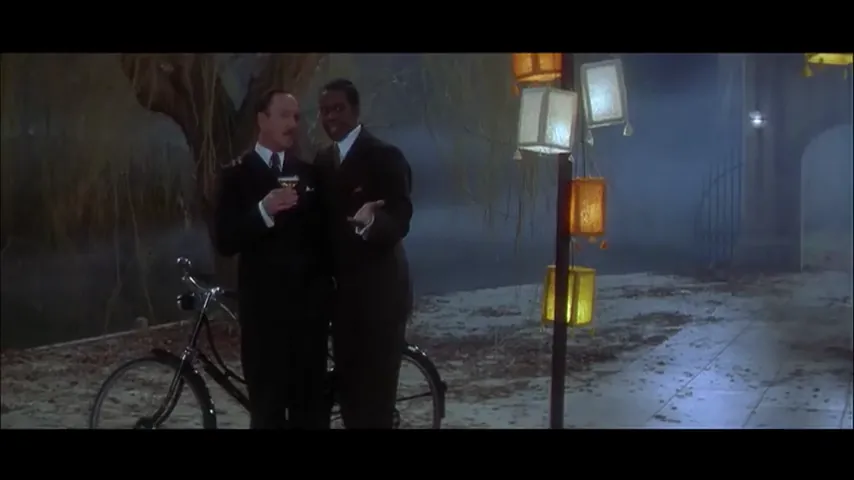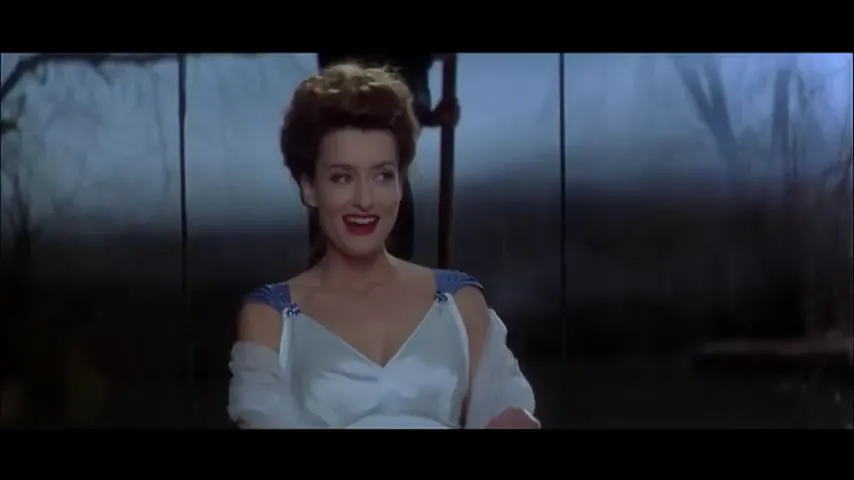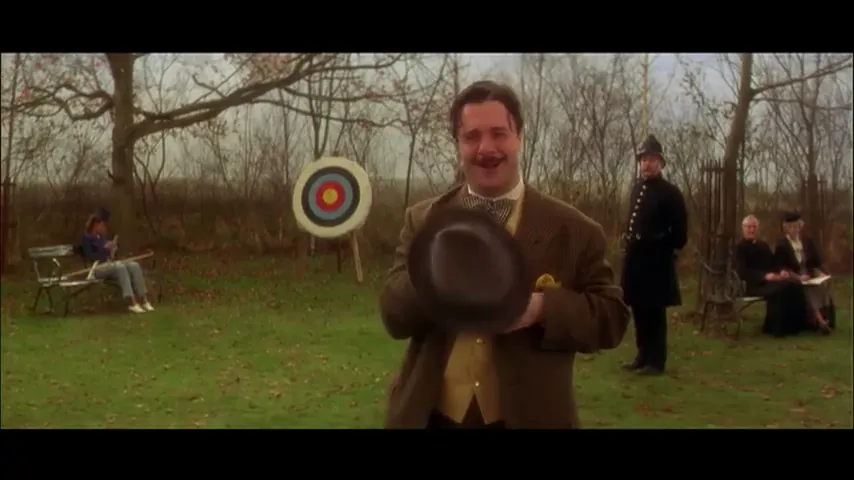🎯 Quick Overview
Trailer
- Director: Kenneth Branagh
- Genre: Comedy, Musical, Romance
- Release year: 2000
- Runtime (length): 1h 33min
- IMDb rating: 5.9/10 (5.1K votes)
- Rotten Tomatoes: 45%
😅 Plot Summary – Badly Explained
Four guys promise to avoid women for three years to hit the books, but then four ladies show up and ruin *everything* by making them sing and dance instead of study.
🍿 Love’s Labour’s Lost: Detailed Plot Synopsis
An Oath Against Love in Navarre
The film is set against the backdrop of Europe in the late 1930s. The King of Navarre and his three companions, Berowne, Longaville, and Dumaine, make a solemn public vow. They pledge to dedicate themselves solely to study for three years, renouncing the company of women and other worldly pleasures.

Arrival of the Princess of France
Their academic retreat is immediately challenged by the arrival of the Princess of France and her entourage. Accompanying the Princess are three lovely ladies-in-waiting: Rosaline, Maria, and Katherine. The four men find their resolve tested as they are instantly smitten with the visiting women.

Secret Wooing and Musical Numbers
Despite their strict oath, the King and his companions quickly begin to pursue the Princess and her ladies, often in secret. The film incorporates classic songs from the 1930s and 40s, turning key scenes into elaborate musical and dance sequences, reflecting the men’s entertaining but often clumsy efforts to hide their broken vows and express their burgeoning feelings.

⚠️ Spoilers and Ending Explained
🎬 Cast & Characters
- The King (Alessandro Nivola): The leader of Navarre who takes an oath with his lords to forsake women and study, only to immediately fall for the arriving Princess.
- The Princess (Alicia Silverstone): The visiting royal whose arrival with her ladies prompts the King and his lords to break their academic vows and pursue love.
- Berowne (Kenneth Branagh): One of the King’s most articulate lords who swears off women but quickly becomes smitten with the witty Rosaline.
- Rosaline (Natascha McElhone): A sharp-witted lady-in-waiting to the Princess who becomes the main romantic interest of the eloquent Lord Berowne.
- Longaville (Matthew Lillard): One of the King’s three companions who vows to study but joins his friends in pursuing the ladies-in-waiting upon their arrival.
- Maria (Carmen Ejogo): One of the Princess’s charming companions who becomes the object of affection for Lord Longaville after the men break their oath.
💬 Memorable Quotes
- Berowne: “From women’s eyes this doctrine I derive: They are the ground, the books, the academes, from whence doth spring the true Promethean fire. O, we have made a vow to study, lords, and in that vow we have forsworn our books; For when would you, my liege, or you, or you in leaden contemplation have found out such fiery numbers as the prompting eyes of beauty’s tutors have enriched you with? Other slow arts entirely keep the brain, and therefore, finding barren practisers, scarce show a harvest of their heavy toil; But love, first learned in a lady’s eyes, lives not alone immured in the brain but with the motion of all elements courses as swift as thought in every power and gives to every power a double power, above their functions and their offices. It adds a precious seeing to the eye: A lover’s eyes will gaze an eagle blind. A lover’s ear will hear the lowest sound. Love’s feeling is more soft and sensible than are the tender horns of cockled snails. Love’s tongue proves dainty Bacchus gross in taste, for valour, is not Love a Hercules, still climbing trees in the Hesperides? Subtle as Sphinx, as sweet and musical as bright Apollo’s lute, strung with his hair. And when Love speaks, the voice of all the gods make heaven drowsy with the harmony.” – Berowne makes a lengthy and eloquent argument to the King and his friends, asserting that true learning and inspiration come from the eyes of women, contradicting their oath to avoid love.
- Princess: “We are wise girls to mock our lovers so!” – The Princess declares this line during a discussion with her ladies, acknowledging their cleverness in dealing with the men’s attempts at wooing despite their vows.
- Costard: “Remuneration!” – Exclaimed by the clown Costard when he receives a reward, fixating on the payment aspect rather than the deed itself.
- Berowne: “Worthies, away.” – Berowne dismisses the performers of the ‘Nine Worthies’ pageant abruptly after news arrives that signals a shift in tone and events.
💰Box Office
- Budget: $13,000,000 (estimated)
- Domestic Gross: $299,792
- Worldwide Gross: $299,792
💥 Love’s Labour’s Lost Reviews
Personal Review
Okay, so I went into this not really knowing what to expect beyond ‘Shakespeare meets musicals.’ And honestly? It was a ride! It’s totally bonkers at times, like when they suddenly burst into song or float during ‘Cheek to Cheek,’ but there’s a genuine charm to it that won me over. I really loved the whole 1930s aesthetic and the newsreel bits – they added a cool layer. The music selection is fantastic, and even if not everyone was a perfect singer or dancer, they all seemed like they were having so much fun that it was infectious, especially Adrian Lester’s dancing. Yeah, some parts felt a little disjointed, and maybe the story got a bit lost in the spectacle, but overall, I left with a huge smile. It’s not a stuffy adaptation; it’s a playful, ambitious movie that just wants you to enjoy yourself.
- Who would enjoy:
- “Fans of Kenneth Branagh’s distinctive directorial style”
- “Viewers who enjoy classic movie musicals from the 1930s and 40s”
- “Those interested in unconventional Shakespeare adaptations”
- “Audiences looking for a lighthearted romantic comedy with elaborate song and dance”
- Content warnings ⚠:
- “Rated U (Universal – suitable for all, based on the UK rating)”
Professional Reviews
- Fictional: “Kenneth Branagh’s ambitious fusion of Shakespearean comedy and 1930s movie musical is a bold swing, though it doesn’t always connect. The energy is infectious, and the classic tunes arranged by Patrick Doyle are a genuine highlight. While some performances feel slightly out of sync with the musical demands, the sheer creative audacity and charm of the concept shine through, making for a unique and surprisingly fun cinematic experiment.
- Fictional: “Despite a fascinating premise, ‘Love’s Labour’s Lost’ stumbles in execution. The blend of witty verse and Broadway standards feels jarring, exacerbated by a cast not uniformly equipped for both disciplines. While Adrian Lester impresses with his dance skills and Nathan Lane provides comedic relief, the uneven performances and drastic cuts to the original text leave the film feeling like a collection of interesting ideas that never coalesce into a satisfying whole.
- Fictional: “Forget Shakespearean dogma; Branagh’s ‘Love’s Labour’s Lost’ is pure, unadulterated joy for anyone who loves classic musicals. It leans into the inherent silliness of the plot, dressing it up in dazzling 1930s glamour. The musical numbers, while perhaps not technically perfect, are performed with such delightful enthusiasm that they become the film’s heart. It’s a charming, light-hearted romp that dares to be different.
Audience Reactions
Many loved the sheer fun and unique blend of Shakespeare and classic musical numbers.: The 1930s style, the infectious energy of the cast (especially Adrian Lester’s dancing and Nathan Lane’s comedy), and the creative use of classic songs were frequently praised highlights.
Overall Consensus: A highly divisive but often charming experiment that merges Shakespearean comedy with a 1930s movie musical aesthetic, earning praise for its ambition and fun, but criticism for uneven execution and acting.
Awards
🛠️ Behind the Scenes
- “All the actors performed their own singing for the musical numbers, rather than being dubbed.”
- “Kenneth Branagh chose to set the film in 1939, against the backdrop of the impending World War II, providing a poignant contrast to the play’s comedic elements and the escapist musical style.”
- “The film heavily utilizes classic songs from the 1930s and 1940s by legendary composers such as Cole Porter, George Gershwin, Irving Berlin, and Jerome Kern.”
- “The visual style and choreography deliberately mimic the elaborate productions of classic Hollywood musicals, including nods to Busby Berkeley and Fred Astaire and Ginger Rogers films.”
- “Fake newsreel segments in the style of Pathé News were incorporated to provide exposition and frame the story within its historical setting.”
🖥️ How to Watch Love’s Labour’s Lost?
Kenneth Branagh’s musical adaptation of ‘Love’s Labour’s Lost’ was released in 2000. As a catalog title, it may not be consistently available on subscription streaming services. Check platforms like Amazon Prime Video, Apple TV, Google Play, and Vudu for digital rental or purchase options. Physical copies (DVD/Blu-ray) may also be available from major retailers.

🎥 Similar Movies
If you enjoyed Love’s Labour’s Lost, you might like these similar films:
- Much Ado About Nothing (1993): Another lively and accessible romantic comedy adaptation of Shakespeare directed by Kenneth Branagh, featuring an ensemble cast and a focus on witty dialogue and comedic misunderstandings.
- Singin’ in the Rain (1952): This classic Hollywood musical is a prime example of the genre and style that ‘Love’s Labour’s Lost’ pays homage to, filled with iconic song and dance numbers and a joyful, theatrical energy.
- 10 Things I Hate About You (1999): A popular modern adaptation of Shakespeare (‘The Taming of the Shrew’) set in an American high school, demonstrating how Shakespearean themes and characters can be successfully translated to a contemporary setting.
- Top Hat (1935): One of the most iconic Fred Astaire and Ginger Rogers musicals, representing the pinnacle of the lighthearted, stylish, and highly choreographed dance films that ‘Love’s Labour’s Lost’ draws heavy inspiration from.
- West Side Story (1961): A critically acclaimed and hugely successful musical adaptation of Shakespeare’s ‘Romeo and Juliet’, showing a more dramatic interpretation of translating the Bard’s work into song and dance.
🛒 Love’s Labour’s Lost Related Products
- Love’s Labour’s Lost (2000 Film) [Blu-ray or DVD]: Experience Kenneth Branagh’s unique musical adaptation in high definition. This collector’s edition often includes bonus features like deleted scenes or behind-the-scenes looks at the ambitious production.
- Love’s Labour’s Lost Original Motion Picture Soundtrack: Relive the film’s delightful blend of classic Shakespearean dialogue and 1930s musical standards, featuring performances by the cast and Patrick Doyle’s score. Available on CD, Vinyl, or Digital.
- Shakespeare’s Love’s Labour’s Lost (Folger Library Shakespeare Library): Dive into the original play text by William Shakespeare that inspired the film. This edition includes notes, commentary, and background information.
- Vintage 1930s Hollywood Musical Poster Prints: High-quality reproductions of classic movie posters from the era that heavily influenced the film’s aesthetic.
🎧 Soundtrack
Love’s Labour’s Lost features a captivating soundtrack that enhances the movie’s atmosphere and emotional impact. Here are some notable tracks:
- “I’d Rather Charleston” – performed by George Gershwin & Desmond Carter
- “They Can’t Take That Away from Me” – performed by George Gershwin & Ira Gershwin
- “Cheek to Cheek” – performed by Irving Berlin
- “There’s No Business Like Show Business” – performed by Irving Berlin
- “I’m in Heaven” – performed by Irving Berlin
- “The Way You Look Tonight” – performed by Jerome Kern & Dorothy Fields
- “Let’s Face The Music and Dance” – performed by Irving Berlin
- “I’ve Got a Crush on You” – performed by George Gershwin & Ira Gershwin
- “I Won’t Dance” – performed by Jerome Kern & Dorothy Fields/Oscar Hammerstein II/Otto Harbach
You can find the complete soundtrack on Amazon Music and Apple Music.
🤨 FAQ
Yes, Kenneth Branagh’s 2000 film adaptation of Shakespeare’s ‘Love’s Labour’s Lost’ is presented as a musical comedy, incorporating classic songs from the 1930s and 40s into the narrative structure.
The film features a cast including Alessandro Nivola as the King, Alicia Silverstone as the Princess, Natascha McElhone as Rosaline, Kenneth Branagh as Berowne, Matthew Lillard as Longaville, Adrian Lester as Dumaine, Emily Mortimer as Katherine, and Nathan Lane as Costard, among others.
The most significant difference is the integration of 1930s musical numbers, replacing substantial portions of Shakespeare’s original dialogue. The film also updates the setting to the late 1930s and provides a more definitive, arguably happier, resolution to the romantic storylines compared to the play’s ambiguous ending.
The story follows the King of Navarre and his three friends who vow to study and avoid women for three years. Their vow is tested when the Princess of France and her ladies arrive, leading to forbidden romance, comedic misunderstandings, and elaborate musical sequences as the men try to woo the women.
🔥 Bonus Content
Love’s Labour’s Lost (Musical Hell Review #67)
Thinking of watching this musical adaptation of Shakespeare’s play? This review dives into why it’s a bit of a mixed bag, giving you a heads-up on what to expect and why it might not quite hit the high notes.
✨ Rate
There are no reviews yet. Be the first one to write one.





